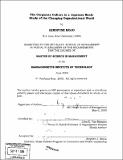The corporate culture in a Japanese bank : study of the changing organizational world
Author(s)
Hojo, Hirofumi
DownloadFull printable version (4.961Mb)
Other Contributors
Sloan School of Management.
Advisor
John E. Van Maanen.
Terms of use
Metadata
Show full item recordAbstract
The environment surrounding companies is constantly changing. and that change forces companies into paradigm shifts. If a company cannot cope with change, it faces the distinct possibility of being be weeded out of the industry. Today, Japanese companies are facing dramatic environmental change. For example, the introduction of new global accounting rules is changing the behavior of equity holders. The long and deep recession following the collapse of the Japanese "bubble" economy continues to sap the economic energy of many Japanese companies, and most leaders of those companies still struggle to find new ways to exit from this dark tunnel. What is happening to corporate organizations in Japan in this changing external environment? To manage a corporate organization in today's changing world, one must understand that the dynamics of corporate culture are important. They are invisible but powerful, influencing peoples' business behavior and organizational business performance as a basic and vital factor of human activity. In this thesis, I analyze corporate culture dynamics in detail, and then develop a case study of the Bank of Tokyo-Mitsubishi, with special focus on Mitsubishi Bank's perspective. (cont.) My purpose is not to evaluate the efficiency or effectiveness of any specific corporate culture but to understand how cultural problems occur during environmental change and the importance of culture management.
Description
Thesis (S.M.)--Massachusetts Institute of Technology, Sloan School of Management, 2005. Includes bibliographical references (leaves 112-113).
Date issued
2005Department
Sloan School of ManagementPublisher
Massachusetts Institute of Technology
Keywords
Sloan School of Management.